|
De Canadese schrijver Philip Michael Ondaatje werd op 12 september 1943 geboren in Colombo, Ceylon (nu Sri Lanka). Zie ook mijn blog van 12 september 2007 en ook mijn blog van 12 september 2008 en ook mijn blog van 12 september 2009.xml:namespace prefix = o ns = "urn:schemas-microsoft-com:office:office" />
Uit: Divisadero
By our grandfathers cabin, on the high ridge, opposite a slope of buckeye trees, Claire sits on her horse, wrapped in a thick blanket. She has camped all night and lit a fire in the hearth of that small structure our ancestor built more than a generation ago, and which he lived in like a hermit or some creature, when he first came to this country. He was a self-sufficient bachelor who eventually owned all the land he looked down onto. He married lackadaisically when he was forty, had one son, and left him this farm along the Petaluma road.
Claire moves slowly on the ridge above the two valleys full of morning mist. The coast is to her left. On her right is the journey to Sacramento and the delta towns such as Rio Vista with its populations left over from the Gold Rush.
She persuades the horse down through the whiteness alongside crowded trees. She has been smelling smoke for the last twenty minutes, and, on the outskirts of Glen Ellen, she sees the town bar on fire the local arsonist has struck early, when certain it would be empty. She watches from a distance without dismounting. The horse, Territorial, seldom allows a remount; in this he can be fooled only once a day. The two of them, rider and animal, dont fully trust each other, although the horse is my sister Claires closest ally. She will use every trick not in the book to stop his rearing and bucking. She carries plastic bags of water with her and leans forward and smashes them onto his neck so the animal believes it is his own blood and will calm for a minute. When Claire is on a horse she loses her limp and is in charge of the universe, a centaur. Someday she will meet and marry a centaur.
The fire takes an hour to burn down. The Glen Ellen Bar has always been the location of fights, and even now she can see scuffles starting up on the streets, perhaps to honour the landmark. She sidles the animal against the slippery red wood of a madrone bush and eats its berries, then rides down into the town, past the fire. Close by, as she passes, she can hear the last beams collapsing like a roll of thunder, and she steers the horse away from the sound.
On the way home she passes vineyards with their prehistoric-looking heat blowers that keep air moving so the vines dont freeze. Ten years earlier, in her youth, smudge pots burned all night to keep the air warm.
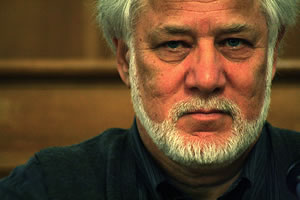
Michael Ondaatje (Colombo, 12 september 1943)
De Duitse dichter en schrijver Werner Dürrson werd geboren op 12 september 1932 in Schwenningen am Neckar. Zie ook mijn blog van 12 september 2007 en ook mijn blog van 12 september 2008 en ook mijn blog van 12 september 2009.
Zuletzt
blieben die Äpfel an
blattlosen Bäumen hängen oder sie
lagen vollzählig im Gras.
Fürs erste wird Schnee die
Äcker bestellen. Über verwischten Zeilen
vielleicht eine Rehspur oder Striche
von Krähenflügeln
Winter in Bosnien
Die zerfetzten Bäume, das
Trümmerholz von den Häusern
der Toten, Schrank Bett Stühle.
Verheizt, sagt der Mann, schiebt
mit klammen Fingern das letzte
Stück Fußboden in den
Küchenherd. Bleiben die Bücher,
sagt er. Falls keine Granate
dazwischenkommt.
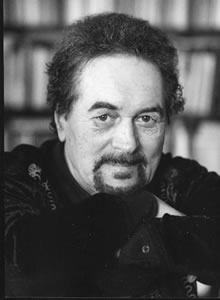
Werner Dürrson (12 september 1932 17 april 2008)
De Amerikaanse schrijver James Frey werd geboren op 12 september 1969 in Cleveland. Zie ook mijn blog van 12 september 2007 en ook mijn blog van 12 september 2008 en ook mijn blog van 12 september 2009.
Uit: Bright Shiny Morning
On September 4, 1781, a group of forty-four men, women and children who call themselves the Pobladores establish a settlement on land that is near the center of contemporary Los Angeles. They name the settlement El Pueblo de Nuestra Señora la Reina de Los Angeles de Porciuncula. Two-thirds of the settlers are either freed or escaped African slaves, or the direct descendants of freed or escaped African slaves. Most of the rest are Native American. Three are Mexican. One is European.
They can see the glow a hundred miles away it's night and they're on an empty desert highway. They've been driving for two days. They grew up in a small town in Ohio they have known each other their entire lives, they have always been together in some way, even when they were too young to know what it was or what it meant, they were together. They're nineteen now. They left when he came to pick her up for the movies, they went to the movies every Friday night. She liked romantic comedies and he liked action films, sometimes they saw cartoons. They started the weekly outing when they were fourteen.
Screaming, he could hear her screaming as he pulled into the driveway. He ran into the house her mother was dragging her along the floor by her hair. Clumps of it were missing. There were scratches on her face. There were bruises on her neck. He pulled her away and when her mother tried to stop him he hit her mother, she tried again he hit her mother harder. Mother stopped trying.
He picked her up and carried her to his truck, a reliable old American pickup with a mattress in the back and a camper shell over the bed.He set her in the passenger seat carefully set her and he covered her with his jacket. She was sobbing bleeding it wasn't the first time it would be the last. He got into the driver's seat, started the engine, pulled out as he pulled out Mother came to the door with a hammer and watched them drive away, didn't move, didn't say a word, just stood in the door holding a hammer, her daughter's blood beneath her fingernails, her daughter's hair still caught in her clothes and hands.
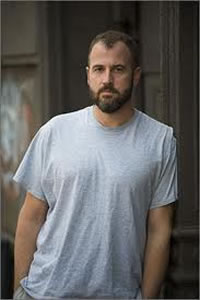
James Frey (Cleveland, 12 september 1969)
De Ierse dichter en schrijver Louis MacNeice werd geboren op 12 september 1907 in Belfast. Hij studeerde aan Oxford, waar hij afstudeerde in klassieke talen en filosofie. In 1930 trouwde hij met Giovanna Ezra en aanvaardde hij een baan als docent klassieke talen aan de Universiteit van Birmingham, een positie die hij bekleedde tot 1936, toen hij Grieks ging doceren aan de Universiteit van Londen. In 1941 trad hij in dienst van de British Broadcasting Company als schrijver en producent. Zoals veel moderne Engelse dichters vond MacNeice een publiek voor zijn werk door de Britse radio. Enkele van zijn bekendste toneelstukken, waaronder Christopher Columbus (1944) en The Dark Tower (1946), werden oorspronkelijk geschreven voor de radio en later gepubliceerd. Ondanks zijn omgang met jonge Britse dichters als Stephen Spender, WH Auden, Christopher Isherwood en andere linkse dichters wantrouwde MacNeice politieke programma's als was hij wars van filosofische systemen. Hij was nooit een lid van de communistische partij of een andere fractie, en hij was heel eerlijk over de onduidelijkheden van zijn politieke opvattingen "My sympathies are Left," schreef hij. "But not in my heart or my guts."
Sunday Morning
Down the road someone is practising scales,
The notes like little fishes vanish with a wink of tails,
Man's heart expands to tinker with his car
For this is Sunday morning, Fate's great bazaar;
Regard these means as ends, concentrate on this Now,
And you may grow to music or drive beyond Hindhead anyhow,
Take corners on two wheels until you go so fast
That you can clutch a fringe or two of the windy past,
That you can abstract this day and make it to the week of time
A small eternity, a sonnet self-contained in rhyme.
But listen, up the road, something gulps, the church spire
Open its eight bells out, skulls' mouths which will not tire
To tell how there is no music or movement which secures
Escape from the weekday time. Which deadens and endures.
The Brandy Glass
Only let it form within his hands once more -
The moment cradled like a brandy glass.
Sitting alone in the empty dining hall...
From the chandeliers the snow begins to fall
Piling around carafes and table legs
And chokes the passage of the revolving door.
The last diner, like a ventriloquist's doll
Left by his master, gazes before him, begs:
'Only let it form within my hands once more.'
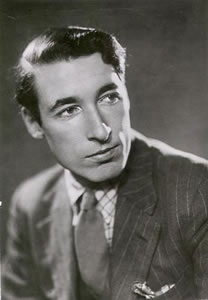
Louis MacNeice (12 september 1907 3 september 1963)
De Nederlandse columnist, journalist en schrijver Eduard Maurits Elias werd geboren in Amsterdam op 12 september 1900. Na het Stedelijk Gymnasium in 's-Hertogenbosch studeerde hij rechten aan de universiteit van Leiden. Tijdens zijn universitaire opleiding begon hij reeds belangstelling te tonen voor literatuur en in 1924 produceerde hij zijn eerste literaire werk. Ook kreeg hij interesse in het zionisme met als gevolg dat hij redacteur werd bij De Joodsche Wachter, het blad van de Nederlandse Zionistenbond. Voorts gaf Elias er de voorkeur aan zich Israëliet te noemen in plaats van zichzelf als Jood te afficheren. Hij studeerde in 1927 af en startte in 1928 zijn werkzame leven met een baan in de journalistiek, een vak wat hij met een onderbreking tijdens de Tweede Wereldoorlog zijn gehele verdere leven zou uitoefenen. In 1939 vertrok Eduard Elias, bezorgd over de oorlogsdreiging, eerst naar de Verenigde Staten en vervolgens naar Curaçao waar hij als ambtenaar werkte voor het Netherlands Information Bureau. Na zijn terugkeer in 1945 trad Elias in dienst bij Elseviers Weekblad, waar hij meerdere rubrieken verzorgde onder de pseudoniemen Flaneur en Edouard Bouquin en waarmee hij pagina 2 goeddeels vulde met zijn rubriek Praetvaeria. Slechts twee boeken verschenen onder pseudoniem, voor de overige titels tekende hij als Mr. E. Elias. Eduard Elias was mede-oprichter van het satirisch tijdschrift Mandril. Maandblad voor mensen (1948-1953) en had op Curaçao ook meegewerkt aan het literaire tijdschrift De Stoep.
Uit: Praetvaeria
PROTEST
Onze man Rudolf (die men gerust alomtegenwoordig mag noemen) was er weer bij toen
een heer in heftig debat gewikkeld was met een restauranthouder. Blijkens wat onze man Rudolf uit het opgewonden debat opving, kwam de zaak hierop neer: de heer had twaalf vlees-croquetten-om-mee-te-nemen gekocht, nadat hij van de ober de stellige verzekering had gekregen dat zij van extra-gemalen houtwol (met meel) waren gemaakt. De heer (die analyst bleek te zijn) had echter de vleescroquetten onderzocht en was tot de ellendige conclusie gekomen dat dat van die houtwol maar een smoesje was geweest en dat zij van gemalen Palthedozen (met meel) waren gemaakt. De restaurateur had uitgeroepen: Een kind kan begrijpen, dat houtwol te kostbaar is voor vleescroquetten, die maar één gulden per stuk kosten!" Maar de analytische heer had zich niet laten overtuigen: Uw ober heeft mij houtwol gegarandeerd!", riep hij (hartstochtelijk) uit, "trouwens, in een zaak van de standing als de uwe verwacht ik eigenlijk niet minder; Palthedoos-croquetten kan ik bij mij op de hoek voor drie kwartjes per stuk krijgen. Daar behoef ik niet voor bij u te komen." Het zal wel een rechtszaak worden, dacht onze man Rudolf.
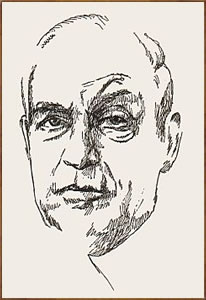
Eduard Elias (12 september 1900 14 januari 1967)
Zie voor nog meer schrijvers van de 12e september ook mijn vorige blog van vandaag.
|



